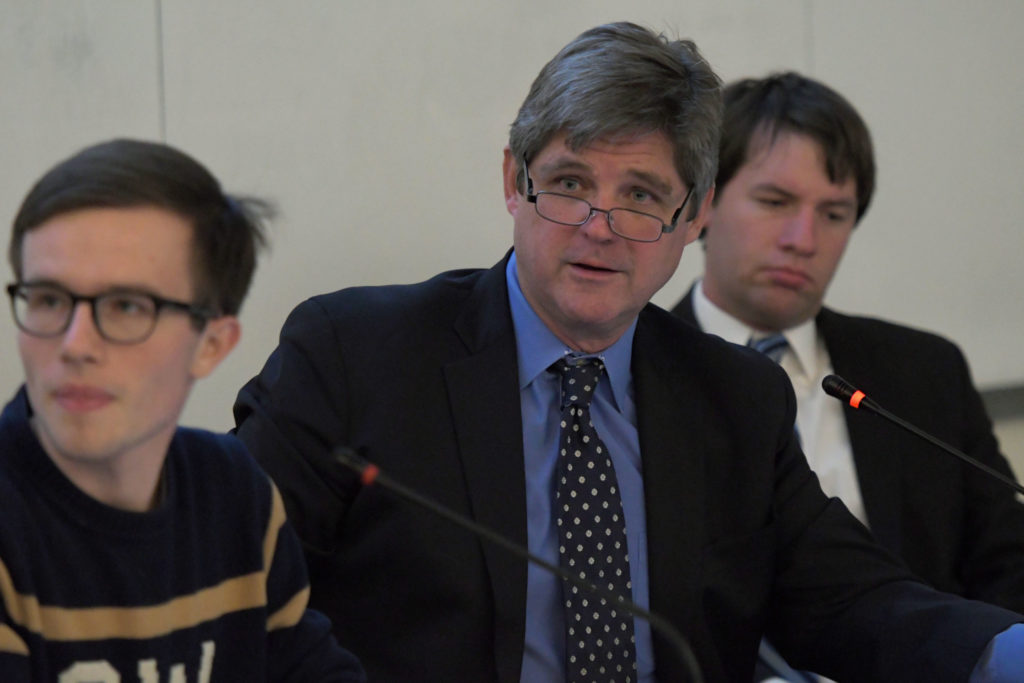A local governing group passed a series of environmental and health resolutions Wednesday during its last meeting of the year.
The Foggy Bottom and West End Advisory Neighborhood Commission considered three pieces of legislation supporting cuts to greenhouse gas emissions, the creation of a new government position to help residents navigate dementia and the extension of the District’s Alzheimer’s plan. The commission also passed a resolution lauding GW for allegedly taking a stance against the construction of a new tower next to GW Hospital.
The group also passed a resolution Wednesday encouraging the D.C. Council to ceremonially name a part of a Foggy Bottom street in front of the Saudi embassy in honor of slain Washington Post columnist Jamal Khashoggi.
Criticizing plans for a new hospital tower
Commissioners unanimously passed a resolution condemning legislation that the D.C. Council introduced last month that would allow the GW Hospital to construct a new tower featuring more than 250 beds. The legislation has garnered criticism because it also allows the hospital to expedite construction by bypassing laws requiring the State Health Planning and Development Agency to determine if the project is a public need.
Commissioners expressed concerns at a meeting last month that the D.C. Council’s health committee did not consult commissioners that serve Ward 2 and did not notify the University before proposing the bill.
Chairman William Kennedy Smith said GW recently sent the ANC a letter criticizing the construction of the tower. He said that if the University’s position stays the same, there is no guarantee that the tower will be built because GW owns the land the hospital sits on.
The resolution commended the GW’s “thoughtful plan for the future of the University’s health care-related activities.”
“There have been plenty of instances in the past where the community and the University have had disagreements,” Smith said. “I think they have shown the kind of values that really mean a great future for the relationship between the ANC, community and them.”
Reducing emissions
The ANC unanimously passed a resolution supporting a D.C. Council bill requiring the city to reduce its carbon and greenhouse gas emissions by 50 percent and draw 100 percent of D.C. electricity from renewables by 2032. The resolution also mandates the elimination of all carbon emissions by 2050.
Tommy Wells, the director of the D.C. Department of Energy and the Environment, said the bill’s requirements would be “game-changing.”
“This puts D.C. once again at the front of the nation in addressing climate change, where our citizens here of course believe in science,” Wells said.
James Harnett, a junior and ANC commissioner, said the act would help counteract concerns about carbon and greenhouse gas emissions that are frequently discussed in the news. Thirteen federal agencies released the fourth National Climate Assessment last week laying out the negative effects of climate change on the environment and people’s health.
Commissioners added a clause to the resolution supporting a carbon and greenhouse gas emissions cap and opposing increasing costs of energy programs to fund low power usage.
“We feel like those proposals are going to be the thing that will actually get us to the final mile and protect our planet for future generations,” Harnett said.
Helping residents with dementia
The commission passed a resolution nearly unanimously supporting a proposal for D.C. to create a citywide position for a dementia services coordinator who would provide families with information about care for residents with the illness. The group also passed a resolution calling for a five-year extension of the city’s five-year Alzheimer’s plan, which is set to expire in 2019.
Commissioner Florence Harmon, who introduced the resolutions, said she recently found out about the plan when she put her mother into Forest Side, a senior living community in the District.
“For me, to figure out what to do was just really challenging,” Harmon said. “There’s no central place in the district government where you go for resources so this sounds like a good thing to me.”





